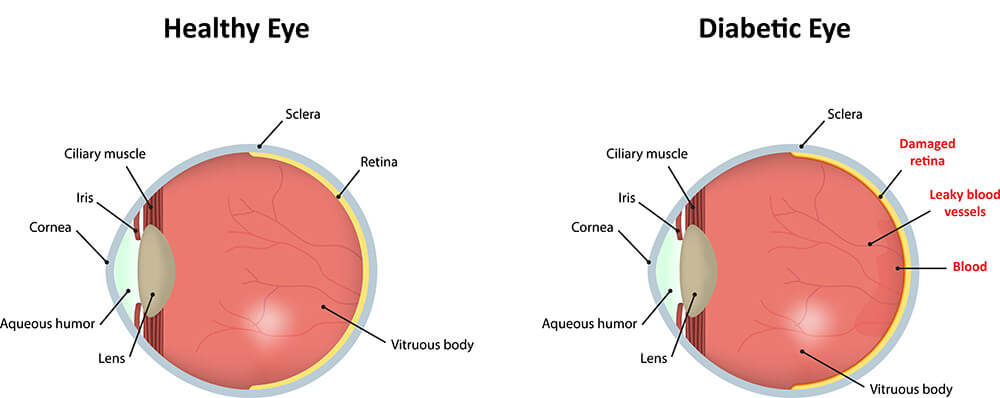Home » Diabetic Eye Disease Management
Diabetic Eye Disease Management
Don’t Let Diabetic Eye Disease Compromise Your Vision
Howerton Eye is passionate about helping our patients achieve beautiful, crystal-clear vision. Our ophthalmologists and highly-trained team of eye care specialists work hard to customize treatment to the unique needs of each individual patient, designing personalized treatment plans to combat any eye disease or chronic eye condition. For patients with diabetes, eye disease is even more of a concern, so it’s important to get a head start on prevention and treatment.
About Diabetic Eye Disease
Unfortunately, people suffering from diabetes are at a higher risk for a number of eye diseases, many of which can lead to severe vision loss and blindness. Diabetes places patients at a higher risk for cataracts, glaucoma, and diabetic retinopathy, all of which can threaten vision and negatively affect daily life.
What causes Diabetic Retinopathy?
Diabetes can clog and damage blood vessels, including those in the retina, which are crucial to vision. Diabetic retinopathy occurs when the blood vessels in the retina become damaged and can no longer effectively transport blood, cutting off the retina’s supply to crucial blood and oxygen. Diabetic retinopathy can occur with both Type I and Type II diabetes, and it usually affects both eyes. Diabetic retinopathy is a progressive disease with four stages of development:
- Mild Non-Proliferative Retinopathy: Characterized by minor swelling in small regions of the blood vessels in the retina. At this stage, vision is usually unaffected.
- Moderate Non-Proliferative Retinopathy: Blockages form in the blood vessels leading to the retina.
- Severe Non-Proliferative Retinopathy: The blocked blood vessels cause malnourishment in the retina, causing the body to create new blood vessels.
- Proliferative Retinopathy: In this final and most serious stage, new blood vessels form along the surface of the retina, but they’re extremely fragile. This frequently causes them to leak, which can endanger vision and result in severe vision loss and blindness. The bleeding can also cause a macular edema, which impairs vision.
Symptoms
Unfortunately, there are no symptoms during the early stages of diabetic retinopathy, which is what makes the disease so dangerous. In the later stages, swelling from the leaked blood can blur and distort vision, making objects look bigger, smaller, blurred, or otherwise distorted.
If you have diabetes and experience blurring in your vision or odd floating spots, please contact us immediately to schedule a consultation with one of our eye doctors. Without prompt treatment this condition can easily cause serious vision loss or blindness, and the earlier you begin treatment, the more likely it is the treatment will work.
Diagnosing Diabetic Retinopathy
Because there are no symptoms in the early stages of this eye disease, the only way to diagnose it early is to catch it at a routine eye exam. This is why it’s critical for patients with diabetes to maintain regular visits to our Austin, South Austin, or Kyle, TX office for examinations. Your ophthalmologist will watch your eyes carefully for any signs of retinopathy, working with you to manage and prevent this condition. If the disease progresses to later stages, we may be able to use laser treatments to shrink the new blood vessels, which can preserve vision.
Prevention
Prevention is the best way to fight retinopathy, and the key to prevention is carefully managing your blood sugar level, blood pressure, and blood cholesterol. Unfortunately, there is no cure for diabetic retinopathy, but through careful management of blood sugar, a healthy diet and exercise regimen, and regular visits to our office for eye exams, you and your ophthalmologist can keep your diabetes in check and prevent retinopathy.
At Howerton Eye, we are experts in diabetic eye care with years of experience treating patients at all stages of the problem. We’ll work with you to prevent, diagnose, and manage eye diseases before they damage your vision. To schedule an exam at our Austin, South Austin, or Kyle, TX office, please call us at (512) 443-9715. You can also book an appointment online or reach out to us through our contact page.
Request an Appointment



